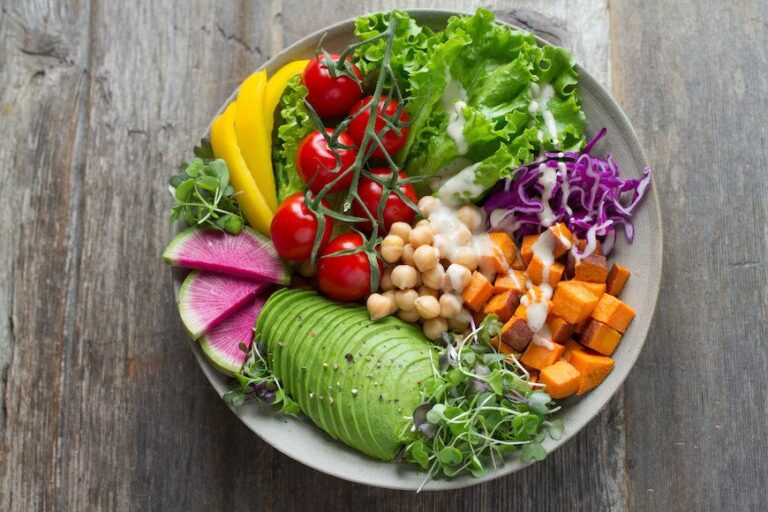"Nourish Your Skin: What Not to Eat for a Radiant Glow"

!Superfood Chopped Salad with Salmon & Creamy Garlic Dressing
For most of us, aging gracefully is easier said than done. Sun damage from our teens and busy schedules often leave us with little time to take care of ourselves. However, achieving that youthful glow doesn’t have to be elusive. Prioritizing healthy foods and proper hydration can make a significant difference.
We sought out the expert advice of Dr. Sarah Sawyer, a board-certified dermatologist based in Birmingham, Alabama. Dr. Sawyer specializes in anti-aging and cosmetic dermatology and is also board certified in Integrative Medicine. Her holistic approach blends traditional and alternative strategies to prevent disease and aging.
The Role of Nutrition in Glowing Skin
“Nutrition plays a role in multiple ways, but primarily through the path of inflammation,” says Dr. Sawyer. “We know now that many skin diseases, including aging, are a result of inflammation in the body. There is great data that shows the skin negatively responds to systemic inflammation the same way that other vital organs do.”
To achieve radiant skin, Dr. Sawyer advises her patients to follow an anti-inflammatory diet, as outlined by Dr. Andrew Weil. This diet shares similarities with the popular Mediterranean Diet and emphasizes whole, plant-based foods alongside lean protein and healthy fats.
Dr. Weil’s Parameters for a Successful Anti-Inflammatory Diet:
Fruits: Aim for 3-4 servings per day (one serving is equivalent to one medium-sized fruit or ½ cup chopped or dried fruit).
Vegetables: Consume at least 4-5 servings per day (one serving is equivalent to 2 cups of salad greens or ½ cup cooked, raw, or juiced vegetables).
Beans & Legumes: Include 1-2 servings per day (one serving is equivalent to a ½ cup).
Pasta: Limit to 1-2 servings a week (one serving is equivalent to a ½ cup of cooked pasta).
Whole Grains: Aim for 3-5 servings a day (one serving is equivalent to ½ cup cooked grains).
Monounsaturated/Omega-3 Rich Fats: Consume 5-7 servings per day (one serving is equivalent to 1 teaspoon of oil, 2 walnuts, 1 tablespoon of flaxseed, or 1 ounce of avocado).
Fish & Shellfish: Include 2-6 servings a week (one serving is equivalent to 4 ounces).
Whole-Soy Foods: Aim for 1-2 servings a day (one serving is equivalent to ½ cup tofu or tempeh, 1 cup soy milk, ½ cup cooked edamame, or 1 ounce soy nuts).
Cooked Asian Mushrooms: Enjoy unlimited amounts.
Dairy, Poultry, and Grass-Fed Meats: Limit to 1-2 servings a week (one serving is equivalent to 1 ounce of cheese, an 8-ounce serving of dairy, 1 egg, or 3 ounces of cooked poultry or skinless meat).
Foods to Avoid for Glowing Skin
To maintain a healthy complexion, it’s important to avoid certain foods that can trigger inflammation and skin issues. Here are some of the top culprits:
1. Sugary Foods and Drinks
Why They’re Harmful:
- Glycation: Excess sugar in your bloodstream attaches to proteins, forming harmful molecules called advanced glycation end products (AGEs). These AGEs damage collagen and elastin, which keep your skin firm and elastic.
- Inflammation: High sugar intake increases inflammation, exacerbating skin conditions like acne and rosacea.
Common Culprits:
- Candy and sweets
- Soda and other sugary drinks
- Pastries, cakes, and cookies
2. Processed and Fast Foods
Why They’re Harmful:
- Unhealthy Fats: Trans fats and excessive saturated fats found in processed and fast foods can lead to clogged pores and inflammation.
- Low Nutritional Value: These foods often lack essential nutrients like vitamins A, C, and E, which are vital for skin health.
Common Culprits:
- French fries and fried chicken
- Processed snacks like chips and crackers
- Pre-packaged meals and frozen dinners
3. Dairy Products
Why They’re Harmful:
- Hormones: Dairy products, especially non-organic, can contain hormones that may trigger acne and other skin issues.
- Insulin Levels: Dairy can spike insulin levels, leading to increased oil production and clogged pores.
Common Culprits:
- Milk and cheese
- Ice cream and yogurt
- Butter and cream
4. Refined Carbohydrates
Why They’re Harmful:
- Blood Sugar Spikes: Foods high in refined carbs can cause rapid spikes and drops in blood sugar, leading to inflammation and potential acne flare-ups.
- Nutrient Deficiency: These foods often lack essential nutrients that support skin health.
Common Culprits:
- White bread and pasta
- White rice
- Baked goods made with refined flour
5. Alcohol
Why It’s Harmful:
- Dehydration: Alcohol is a diuretic, which can lead to dehydration and dull, dry skin.
- Liver Function: Excessive alcohol consumption can impair liver function, crucial for detoxifying the body and maintaining healthy skin.
- Inflammation: Alcohol can increase inflammation and potentially worsen conditions like rosacea.
Common Culprits:
- Beer, wine, and spirits
- Cocktails with added sugars
6. Salty Foods
Why They’re Harmful:
- Water Retention: High salt intake can cause the body to retain water, leading to bloating and puffiness, especially around the eyes.
- Dehydration: Excessive salt can also contribute to dehydration, making the skin appear dry and lackluster.
Common Culprits:
- Potato chips and pretzels
- Canned soups and processed meats
- Restaurant and take-out foods
7. Caffeinated Beverages
Why They’re Harmful:
- Dehydration: Caffeine is a diuretic, and excessive consumption can lead to dehydration, making the skin look dull and tired.
- Sleep Disruption: Caffeine can interfere with sleep, and poor sleep quality is linked to increased signs of aging and reduced skin repair.
Common Culprits:
- Coffee and energy drinks
- Certain teas and sodas
- Chocolate products
Remember, glowing skin starts from within. By incorporating these nutrient-rich foods and avoiding inflammatory triggers, you’ll be well on your way to achieving that radiant complexion.
